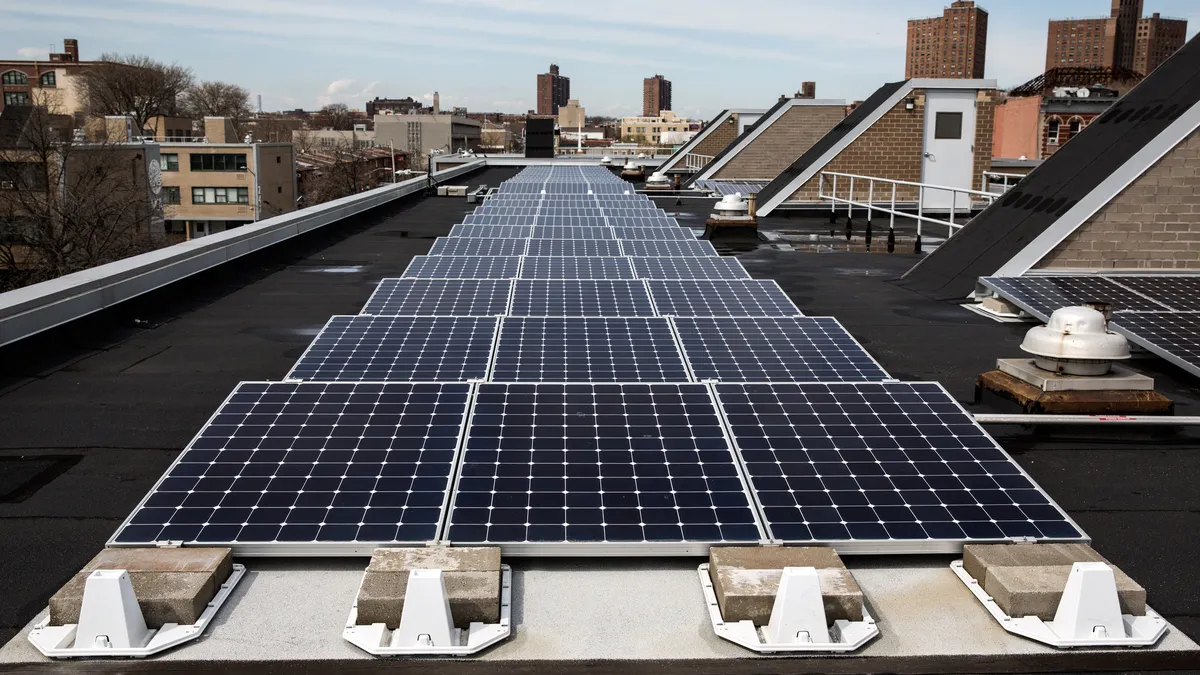Dive Brief:
- The continued growth of residential solar is under threat in Illinois, the solar industry said this week, with Ameren asserting a 2016 state law allows it to stop compensating home solar customers at the full retail rate for the power they send back to the grid.
- The Future Energy Jobs Act of 2016 allows a utility to work with state regulators to replace the full retail rate, based on net metering, with a negotiated "distributed generation rebate" when the amount of distributed solar generation reaches 5% of the peak demand on the system. Ameren says it will soon reach that threshold.
- The Illinois Commerce Commission (ICC) has set a public meeting for today, following an emergency request from the solar industry and environmental groups asking it to order Ameren to continue full retail compensation, kilowatt-hour for kilowatt-hour, until a new distributed generation tariff is developed, as required by the 2016 law.
Dive Insight:
The roots of what solar advocates now say is a crisis stretch back to March when Ameren announced that distributed solar generation had reached 3% of its load, a threshold which, by law, required the ICC to open a case and begin developing a replacement for the net metered full retail tariff that home solar owners had expected when financing their projects.
In July, ICC administrative law judge Leslie Haynes ruled that Ameren had not correctly calculated the percentage of customer-based distributed generation, based on her interpretation of the law. In its response asking for reconsideration, Ameren noted that her statutory interpretation meant the solar generation only amounted to 1.67%, not the 3% the utility had figured.
Among the reasons for the difference were issues as to whether the utility had included the output of large community solar arrays and whether it had included demand served by independent power providers when calculating the percentage of distributed solar generation serving the system.
The company's annual net metering report, filed with the ICC on March 31, stated that total system peak demand as of Feb. 10 had been 1,939.86 megawatts and the total generating capacity of 3,177 customers on net metering was 50,725.71 kilowatts.
In a Sept. 10 memo to the ICC, Haynes urged the commission to direct its staff to begin investigating Ameren's claims that it can now abandon its net metering rider even though the ICC and the company have not yet developed a distributed generation tariff. Haynes noted that until that happens, it must "operate in compliance with the [existing] tariff."
Haynes on Sept. 24 issued an order continuing the ongoing hearing on the issue until Oct. 9.
But a coalition of solar installers and environmental groups on Monday filed a request for the immediate emergency order specifically requiring Ameren to continue the existing full retail net metering rider. The coalition says that allowing Ameren to abandon net metering without a rebate tariff in place would cripple further solar development — exactly the opposite of what the Future Energy Jobs Act of 2016 was designed to do.
“This move is contrary to Illinois’ commitment to creating jobs, protecting consumers and expanding clean energy,” said Nakhia Morrissette, central region director and counsel for Solar Energy Industries Association (SEIA) in a prepared release. “We’re calling on the ICC to fix it urgently before we lose more solar jobs.”
The ICC set an open meeting for today and the administrative law judge set a deadline for written comments by the close of business Wednesday.
In its response to the emergency meeting request, Ameren wrote that there is no emergency, that it would abide by the net metering tariff until the ICC replaces it, and that it would be filing a proposal by the end of the week explaining how residential customers with installed solar can apply for the new distributed generation rebates after "locational rebate values have been calculated."
Unlike the current retail net metering tariff, which credits a residential solar customer for excess power sent into Ameren's delivery system at the same rate that customer pays to buy power, the rebate tariff is expected to include only the cost of the energy, not delivery costs. And the rebate is expected to vary by location.
Correction: This story has been updated to remove an incorrect pronoun for the administrative law judge.
Correction: The Oct. 2 update to this story has been amended to reflect the fact that the Illinois Commerce Commission did not grant an emergency motion from solar advocates requesting that it order Ameren to continue offering full retail net metering to its customers, but still 'urged' the company to do so.














